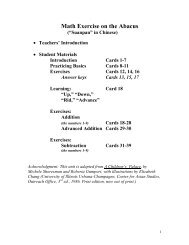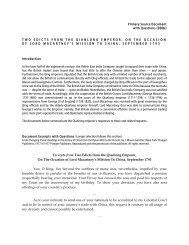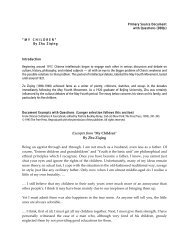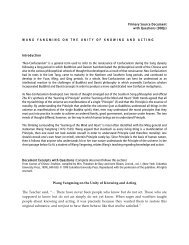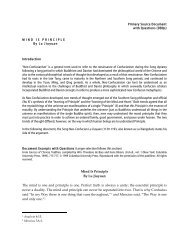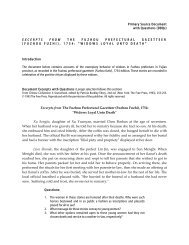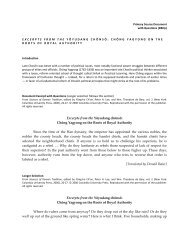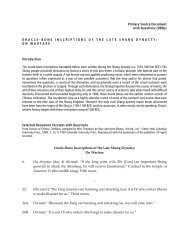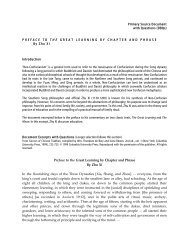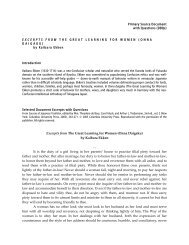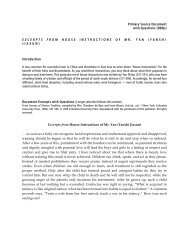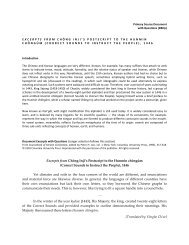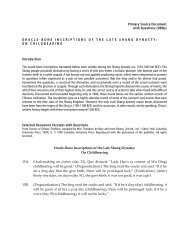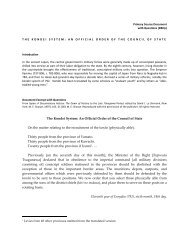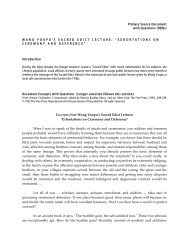The Great Tang Code: Article 6, "The Ten Abominations" - Asia for ...
The Great Tang Code: Article 6, "The Ten Abominations" - Asia for ...
The Great Tang Code: Article 6, "The Ten Abominations" - Asia for ...
You also want an ePaper? Increase the reach of your titles
YUMPU automatically turns print PDFs into web optimized ePapers that Google loves.
Primary Source Document, with Que stions (DBQs) on S EL EC TI ON S F ROM THE GREA T TA NG CODE:<br />
A RTICLE 6, “THE TEN A BOMINATIONS,” BY ZHA NGSUN WUJI<br />
Subcommentary: <strong>The</strong> Gongyang Commentary states: “<strong>The</strong> ruler or parent has no harborers [of <br />
plots]. If he does have such harborers, he must put them to death.” This means that if there are <br />
those who harbor rebellious hearts that would harm the ruler or father, he must then put them <br />
to death. <strong>The</strong> Zuo Commentary (Zuozhuan) states: “When the seasons of Heaven are reversed, we <br />
have calamities … when the virtues of men are reversed, we have disorders.” <br />
<strong>The</strong> king occupies the most honorable position and receives Heaven’s precious decrees. Like <br />
Heaven and Earth, he acts to shelter and support, thus serving as the father and mother of the <br />
masses. As his children, as his subjects, they must be loyal and filial. Should they dare to cherish <br />
wickedness and have rebellious hearts, however, they will run counter to Heaven’s constancy <br />
and violate human principle. <strong>The</strong>re<strong>for</strong>e this is called plotting rebellion. <br />
<br />
Questions:<br />
1. What kinds of language and metaphors does the author of the <strong>Tang</strong> <strong>Code</strong><br />
use to describe “plotting rebellion”?<br />
2. How does the language used here help to underline the seriousness of the<br />
offense?<br />
Subcommentary: <strong>The</strong> kindness of father and mother is like “great Heaven, illimitable.” <br />
“Entering into the inheritance of our ancestors,” we may not be frivolous. Let one’s heart be like <br />
the xiao bird or the jing beast, 1 and then love and respect both cease. Those whose relationship is <br />
within the five degrees of mourning are the closest of kin. For them to kill each other is the <br />
extreme abomination and the utmost in rebellion, destroying and casting aside human <br />
principles. <strong>The</strong>re<strong>for</strong>e this is called contumacy. <br />
Commentary: Contumacy means to beat or plot to kill [without actually killing] one’s <br />
paternal grandparents or parents; or to kill one’s paternal uncles or their wives, or one’s elder <br />
brothers or sisters, or one’s maternal grandparents, or one’s husband, or one’s husband’s <br />
paternal grandparents, or his parents. … <br />
Questions:<br />
3. <strong>The</strong>se passages from the subcommentary and commentary describe the<br />
fourth of the “ten abominations” -- contumacy. Why should this offense of<br />
beating or plotting to kill certain family members be considered as one of<br />
the ten most serious offenses from the point of view of the <strong>Tang</strong> imperial<br />
government?<br />
<strong>Article</strong>: <strong>The</strong> fifth is called depravity (budao). <br />
Subcommentary: This article describes those who are cruel and malicious and who turn their <br />
backs on morality. <strong>The</strong>re<strong>for</strong>e it is called depravity. <br />
Commentary: Depravity means to kill three members of a single household (jia) who have <br />
not committed a capital crime, or to dismember someone. … <br />
<br />
1 <strong>The</strong> earliest Chinese dictionary, the Shouwen jiezi, describes the xiao as an unfilial bird that eats its <br />
mother, coupling it with the jing, an unfilial beast that eats its father. <br />
<strong>Asia</strong> <strong>for</strong> E duca tors | Columbia University | http ://afe.easia.columbia.edu Page 2 of 6



